It is a lot of work to run a guild; it isn't all about collecting money and living the high life.

| Guild Master (2020) | |||||
| Designer(s) | Chris Antony | Artist(s) | Andrew Bosley, Aleksandar Mihajlovic, Yamandú Daniel Orce | Publisher |
Good Games Publishing |
| 2-4 | 14+ | 60-120m | |||
The three most important aspects of any guild are: Fame, Gold, and the Members; as a Guild Master, you must learn to balance these three aspects of your guild.
Fame will bring more jobs your way and increase your overall renown across the world; anyone out for adventure is hoping to leave their last mark on the world...as well as putting gold in their pocket. Guilds are expensive to run; you must keep members happy by keeping coin in their pouch and ale in their bellies; there are plenty of guilds who will be happy to take your best members into their ranks if you can't keep them satisfied. Let's not forget how important it is to have a grand guild hall!
In Guild Master, you are basically trying your build up your guild with these factors in mind. You must use your starting members to complete jobs increasing your gold, use that gold to recruit new members and guild your guild hall, and repeat the process while continuing to build up your fame each action taken. Do you have what it takes to be a Guild Master?
Note: This will be a longer review as I am going to go over a lot of the rules; if you are just looking for our impression of the game, feel free to jump to the Final Thoughts section and see if it sounds like something you are interested in. If you like how the game sounds, feel free to read over the rest of the review.
Box and Components
My first impression of this game based on the weight of the box was, "wow, this is heavier than I expected." I was initially intimidated by the game when I first started pulling the components out, but once I got everything separated and knew what each piece was for, it wasn't bad at all. The box itself is just slightly bigger than a standard Ticket to Ride box.
The game includes a lot of stuff; I will just pop in a list from their website.
- 1 x Board
- 4 x Order Boards
- 4 x Upgrade Boards
- 4 x Guild Screens
- 4 x Guild Ribbons
- 4 x Fame markers
- 4 x Contest tokens
- 1 x Round marker
- 1 x Builder Cost marker
- 4 x 13 Order Cards
- 35 x Common Contract cards
- 30 x Heroic Contract cards
- 30 x Legendary Contract cards
- 24 x Novice Adventurer cards
- 24 x Adept Adventurer cards
- 16 x Hero Adventurer cards
- 8 x Legend Adventurer cards
- 20 x 1 Gold tokens
- 20 x 2 Gold tokens
- 12 x 5 Gold tokens
- 4 x 20 Gold tokens
- 6 x Starting Skill Upgrade tokens
- 18 x Skill Upgrade tokens
- 15 x Core Upgrade tokens
- 6 x Prestige Upgrade tokens
- 30 x Dice
There are two booklets for this game. The full rules booklet provides all of the details for the game and is needed for the first game. After that, you can utilize the Quick Start Guide to setup. The game is pretty easy to setup once you understand the game, but it is nice they have provided both as they probably realized it was probably needed and didn't want to make the basic rules too big.
The board itself is a double folded board that is probably around 30in x 10in when all unfolded. Around the outside of the track is the fame track and is used for tracking your score in the game. The board itself is broken up into a Round Track, Builder Track, the adventures piles (I like to think of this as the tavern), and the Contracts (job board). Everything is well laid out and makes the game a breeze to setup. It even has markers on the board to indicate which spaces will be used for higher player counts.
There are also a Guild Screen, Upgrades Board, Orders board, and a Guild ribbon for each player. These boards are the only components I wish were a little thicker, but they get the job done and are perfectly fine really. It will take a good bit of force to really bend them; I don't think it will likely happen by accident. The Guild Screen is really nice because it also doubles as the players reference showing the details of each round and other information players may need to know. The purpose of these will be explained later. There are also sets of cards and tokens for each guild that represent their orders and score tracking.
The cards in the game are the different types of adventures and contracts. The cards are pretty good but not super thick; again, I don't think unless you purposely try to bend them you will encounter many issues.
There are four types of adventures:
- Novice: These are starting adventures players will have to start the game with. These adventures have 2-3 points assigned to their skills and may have an ability.
- Adept: These are much better adventures with around 5 points assigned to skills and all have abilities.
- Hero: These are seasoned adventures with 7-9 points assigned to skills and may have much more powerful abilities.
- Legend: These adventures have earned a particular powerful reputation for their ability in 1-2 of the skills typically with 9 points assigned to two skills and abilities that trigger every round.
There are three contract types:
| Points to Succeed | Gold Reward | Fame Reward | Other Details | |
| Common | 6-12 | 2-3 | 1-3 | Boons and Bonuses situationally decent. |
| Heroic | 13-20 | 3-6 | 4-6 | Boons and many more Bonuses; there are a lot of events that will occur while these are in play. |
| Legendary | 21-30 | 4-8 | 1-8 | Most cards have events on them with a few contracts still offering Boons and Bonuses. |
There are 3 sets of smaller dice that are Blue, Red, and Black. I almost wish they had included a fourth set so all players would have dice in their guilds color, but that would have increased the cost. There is also very, very few instances when everyone would need to be rolling the dice simultaneously.
There are a variety of tokens used for money, guild upgrades, and other markers for the game; they are made of a good quality chipboard.
Mechanics
The goal of the game is to have the most Fame after 9 rounds. Fame is awarded by completing Contracts, acquiring new adventures, building on to your guild hall, and money left over at the end of the game.
Setup
I will do a very quick overview of the setup, but there is much greater detail in the rules.
- Give each player their Guild Screen, boards, cards, tokens, 7 gold tokens. Place the Fame marker on 0 on the Fame Track on the main board.
- Place the builder token on the game board on the space for the current player count.
- Place the moon token (flipped to the half moon side) on the 1 on the round track.
- Separate out and shuffle the different types of Adventurer cards.
- Each player will receive 4 Novice Adventurer cards (see rules for specifics)
- Place 8 Adept Adventurer cards on spaces A, B, and C, if there are 4 players.
- Place 8 Hero Adventurer cards on spaces D and E.
- Place 8 Legendary Adventurer cards on space F.
- All remaining Adventurers can be returned to the box.
- Separate out and shuffle the different types of Contract cards.
- Each player will receive two Common Contracts that will be called their Private Contacts.
- Place Common Contracts on spaces 1-4, 5 if there are 3+ players, and 6 if there are 4 players.
- Separate the different upgrade tokens and gold placing them within reach of the players.
- Each player will receive one starting Skill Upgrade; two if there are 4 players. These will be placed on each players Upgrade board.
- The remaining will remain in stacks nearby.
- Any other components not mentioned above should be kept close by.
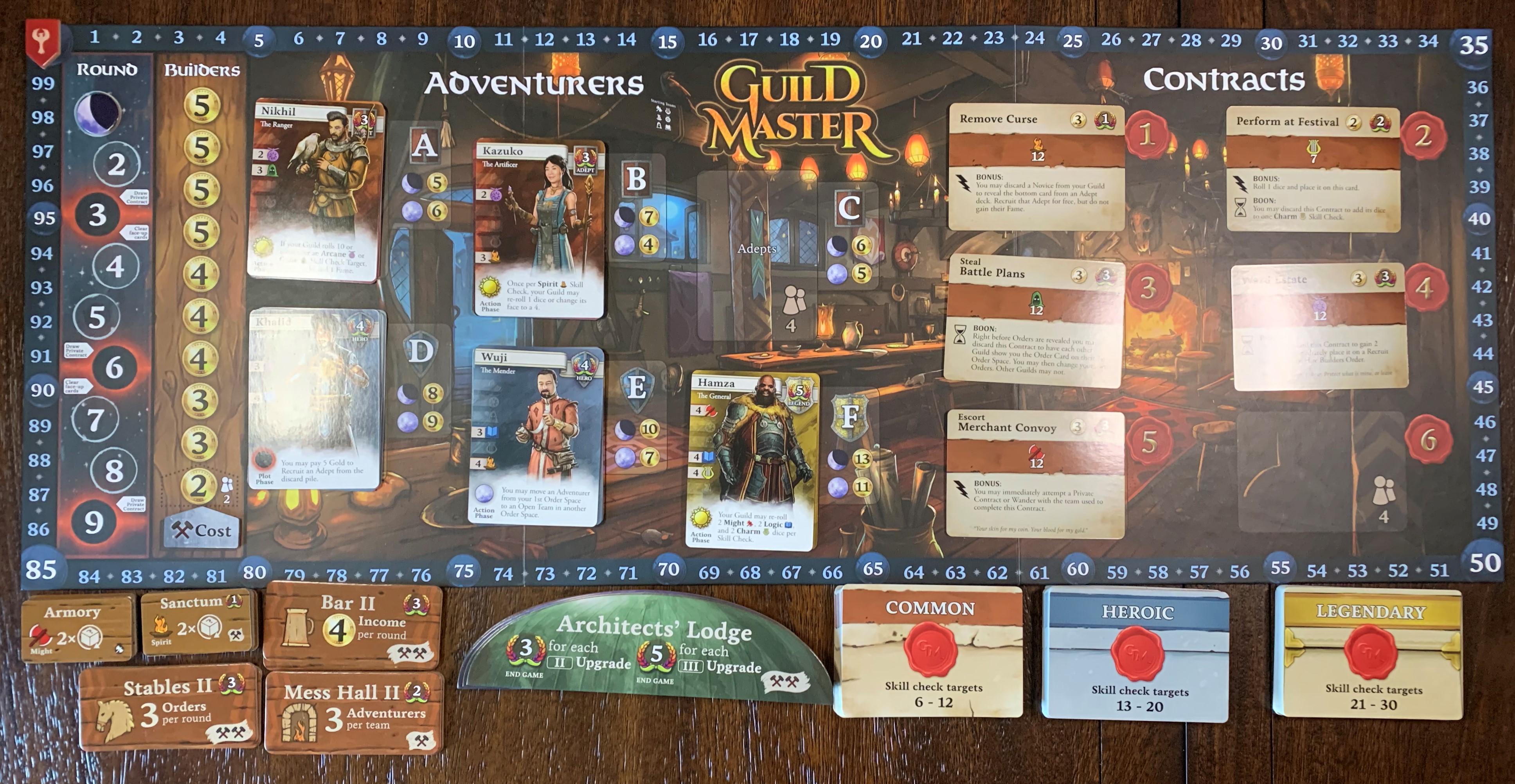
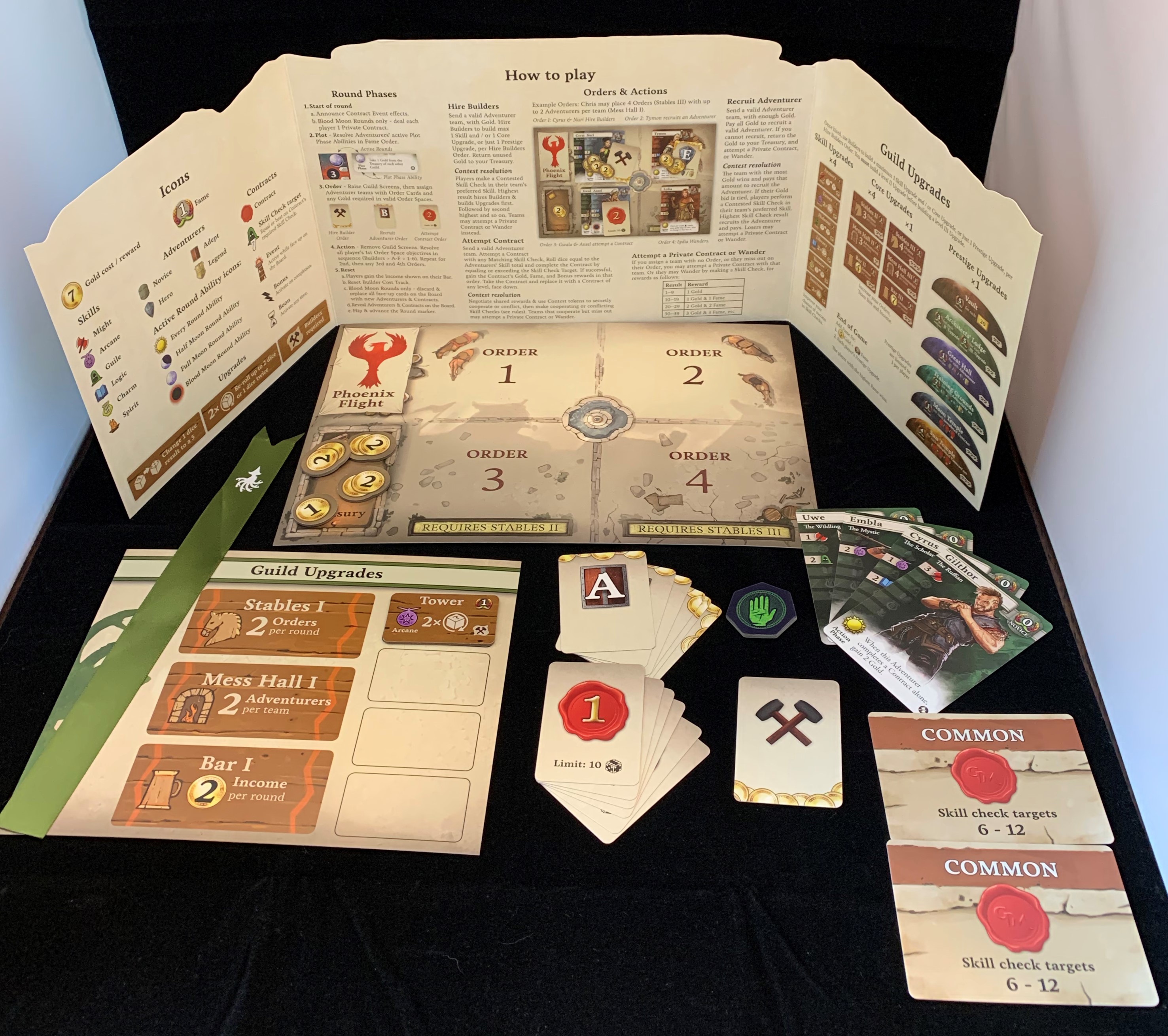
Player Turns
Turns are pretty straight forward following five phases that will be repeated over the nine rounds.
- Start of Round (skipped on Round 1)
- Plot Phase (skipped on Round 1)
- Order Phase
- Action Phase
- Reset Phase
Start of Round
This phase is skipped during the first round because there are no contracts with events out. During this phase, any events that are on face up contracts are announced so players understand the effects in play that round; events are depicted by a light house icon and the text "Event." Events can be good or bad for the players. Good events could make things cheaper or increase rewards for completing contracts. Bad events could prevent players from gaining income or penalize players for not performing certain actions during that round.
If the current round is a Blood Moon (rounds 3, 6, and 9), each player will receive a new private contract.
Plot Phase
Novice adventurers do not have abilities and therefore this phase is skipped on the first round. Some adventures will have abilities that trigger during the plot phase; these abilities are pretty straight forward and trigger by guild with those most fame first descending to the other guilds. All guilds will announce their current gold totals.
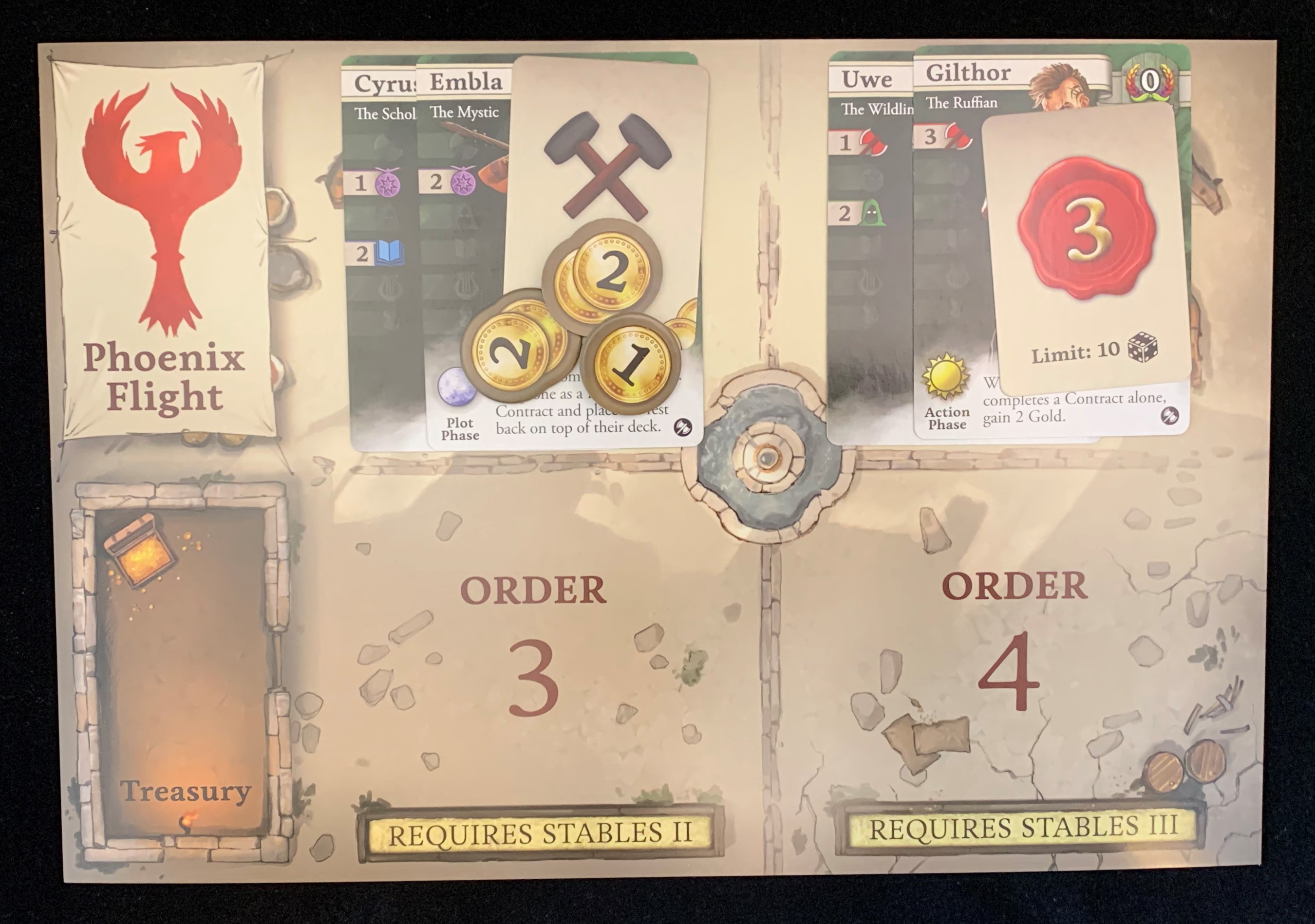 Order Phase
Order Phase
During this phase, players will decide what each of their adventurers will do during that round. Players will use their deck of Order cards to send out their adventurers to recruit additional adventures, expand the guild hall, complete contracts, or to simply wander. To issue orders, players will place one of their order cards on one of the spots on their Orders board along with the adventurers they wish to send out for that task and potentially gold; until guilds expand their guild hall, each guild may only issue two orders and send two adventurers out for each order. Once all players are ready (indicated by placing their guild ribbon on their screen), the screens are removed to reveal the orders.
Action Phase
All orders on the Order 1 spot will happen first with all guilds and may result in a Conflict (covered later in the article) if multiple players have selected the same Order on the same turn. Orders are resolved in the following order:
- Builders: There is one Builder card with a Tools icon. Players will need to send gold with their adventurers fulfilling this order. Builders expand onto guild halls providing them Skill Upgrades, guild hall Core Upgrades allow for more orders to be issued along with other perks, and Prestige Upgrades providing additional Fame at the end of the game. You may build either: (1 Skill Upgrade and/or 1 Core Upgrade) OR (1 Prestige Upgrade). The cost will be based on how many Tool icons are on the upgrades you are seeking to build. Each tool icon on the track will move the Tool token on the Builders track requiring Gold each for each space moved onto. Meaning, the first 2 Tool icons will cost that player 2 + 3 assuming the builder token is at the bottom of the track. This track is reset at the end of each round so don't worry when you see the cost during a round go up to 5 gold. Upgrades tokens are placed on players Guild Upgrade boards in spots they have open or covering the Core Upgrades printed on the boards. Excess gold brought along is retained by the guild. Be sure to award yourself the Fame earned by expanding your guild hall as shown on the upgrade(s).
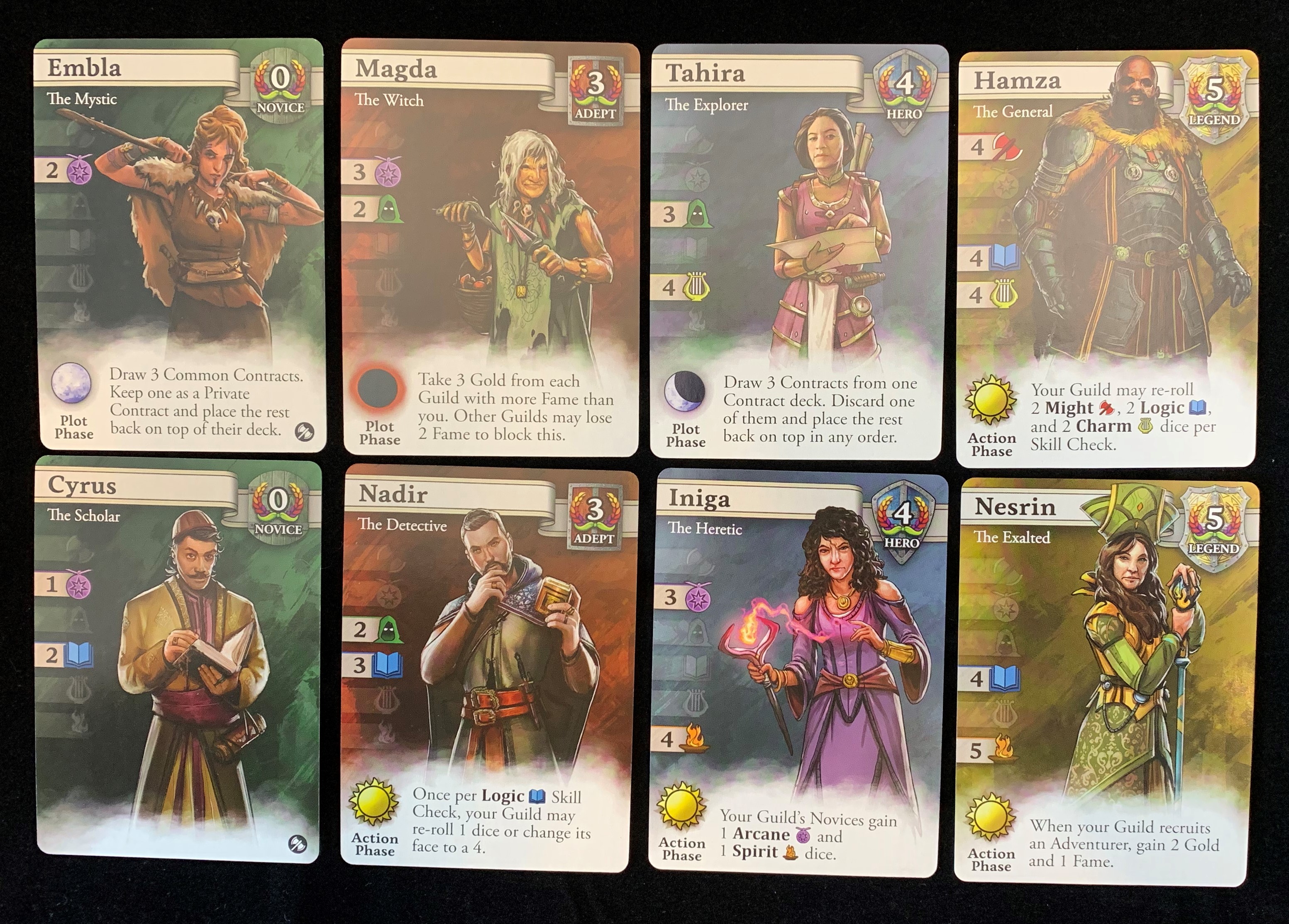 Recruit Adventurers: There are six Recruit Adventurer cards with the letters A-F shown. Each adventurer will require a different minimum gold to recruit them are shown and vary based on the current moon phase (round tracker); you must provide the gold on the Order space before revealing the screen. While the minimum gold can recruit them, if any other player is also trying to recruit that adventurer during the same order, the player offering the most will win the Adventurer; if there is a tie, the players will have to resolve the Conflict. The guild who successfully recruits the adventurer loses all of the Gold they brought, regardless if there was a conflict; losing players will retain their Gold. Players may not recruit Heroic (D-E) Adventurers until they have at least one Adept (A-C) Adventurer, and likewise, Legendary (F) Adventurers can't be recruited until at least one Heroic Adventurer has been recruited. Be sure to award yourself the Fame earned by recruiting the adventurer as shown on the adventurer.
Recruit Adventurers: There are six Recruit Adventurer cards with the letters A-F shown. Each adventurer will require a different minimum gold to recruit them are shown and vary based on the current moon phase (round tracker); you must provide the gold on the Order space before revealing the screen. While the minimum gold can recruit them, if any other player is also trying to recruit that adventurer during the same order, the player offering the most will win the Adventurer; if there is a tie, the players will have to resolve the Conflict. The guild who successfully recruits the adventurer loses all of the Gold they brought, regardless if there was a conflict; losing players will retain their Gold. Players may not recruit Heroic (D-E) Adventurers until they have at least one Adept (A-C) Adventurer, and likewise, Legendary (F) Adventurers can't be recruited until at least one Heroic Adventurer has been recruited. Be sure to award yourself the Fame earned by recruiting the adventurer as shown on the adventurer.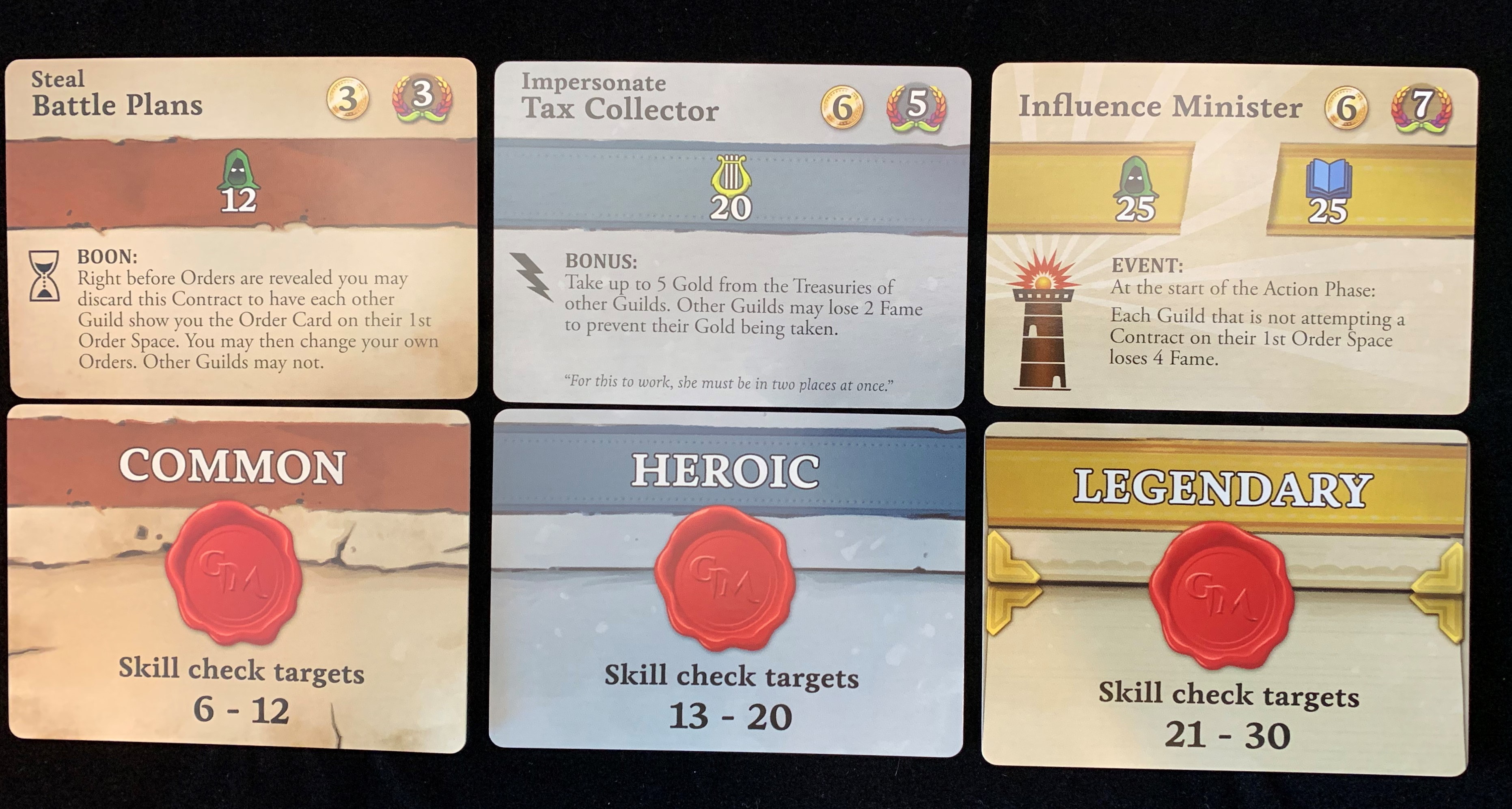 Contracts: There are six contract cards numbered 1-6 with wax seals on them. Contracts will award adventurers fame and gold, but they will require adventurers to complete skill checks. Contracts will have 1 or 2 skill icons along with a number; this will indicate the number number a player must roll within a specific skill to complete the contract. If you send two adventures will a combined Might (Axe icon) of 5, you will roll five dice and add their values together. If the total exceeds the value shown on the card, take the contract, award gold, and fame; some contracts will award an additional "Bonus" benefit immediately. Others may offer a "Boon" that can be used anytime once. Players will select a contract from any tier to replace the one taken from the board, but this will remain face down until later.
Contracts: There are six contract cards numbered 1-6 with wax seals on them. Contracts will award adventurers fame and gold, but they will require adventurers to complete skill checks. Contracts will have 1 or 2 skill icons along with a number; this will indicate the number number a player must roll within a specific skill to complete the contract. If you send two adventures will a combined Might (Axe icon) of 5, you will roll five dice and add their values together. If the total exceeds the value shown on the card, take the contract, award gold, and fame; some contracts will award an additional "Bonus" benefit immediately. Others may offer a "Boon" that can be used anytime once. Players will select a contract from any tier to replace the one taken from the board, but this will remain face down until later.- Wander/Private Contract: You can opt to wander by placing an unused Order card with their guild logo face up. Wandering is simple, pick a skill on your adventures and roll a number of dice equal to their total skill. Player will earn fame/gold equal to the number in the "tens" space on the total rolled (1 gold if under 10 is rolled). Alternately, players may attempt to complete one of their private contracts exactly the same way you would with the public contracts.
If someone has completed an Order on an earlier Order turn that you were planning to do, your adventurers will wander or complete a private contract instead.
Reset Phase
This is the clean up phase of the round.
- Players will clean up their Orders board gain income based on their Bar on their Guild Upgrade card.
- Reset the Builder cost track to the space for the player count.
- If the current round is a blood moon, all face up Adventurers and Contracts on the main board are discarded. Common contracts are placed in all of the Contract spaces.
- Flip up Adventurer and Contract cards.
- Move and flip the round marker.
End Game
Once the 9th round is completed, it is time to finalize everyone's score to see who has acquired the most fame to become the most well known Guild.
- Players will earn 1 Fame for each 5 Gold they have.
- Review each players Prestige Upgrades for and award them fame based on what it says. These are pretty straight forward and typically have you counting up the types of adventurers you have, the type of upgrades, or something else similar.
Once these additions are made to each guild's fame, revel in your guild's victory, which could be shared with other guilds if they have amassed an equal level of fame.
Conflict
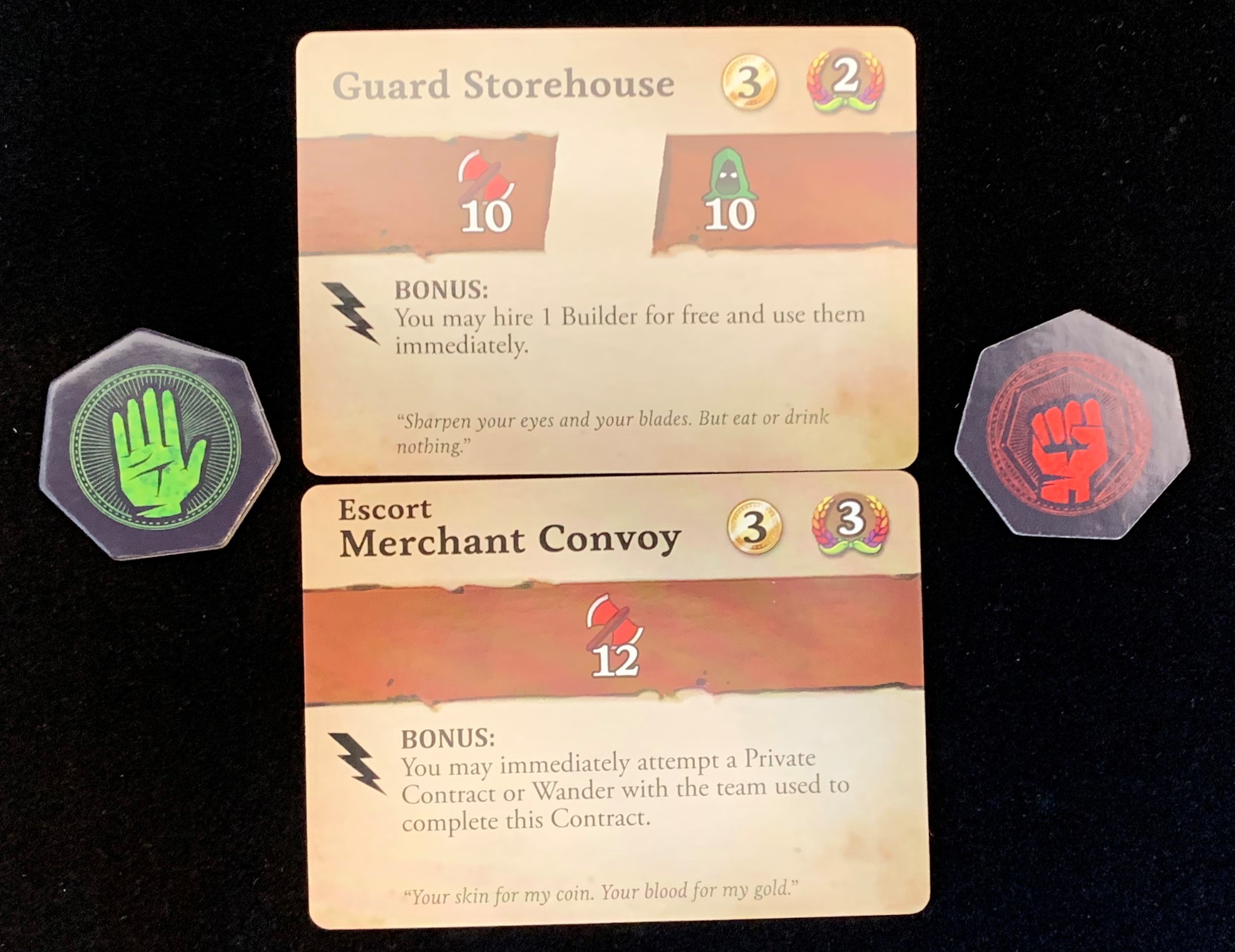 Conflicts during building and recruiting adventurers are pretty straight forward, each player selects skills from their adventurers out for that order and roll a number of dice equal to their total skill level; the selected skill does not have to be the same between each player. Who ever has most, wins and may proceed with the order. During building, the losing player will still be able to build but will go second at a higher cost. During recruitment, there is only one adventurer for each space so the loser will simply retain their gold and may Wander or complete a Private Contract instead.
Conflicts during building and recruiting adventurers are pretty straight forward, each player selects skills from their adventurers out for that order and roll a number of dice equal to their total skill level; the selected skill does not have to be the same between each player. Who ever has most, wins and may proceed with the order. During building, the losing player will still be able to build but will go second at a higher cost. During recruitment, there is only one adventurer for each space so the loser will simply retain their gold and may Wander or complete a Private Contract instead.
For conflicts during contracts, it is a little different. I won't go through all of the details but will try to give a basic flow. Conflicting players will have a decision to make by revealing their Contest token on their decision; players may decide on terms they would agree to before revealing their intentions.
- All Cooperate - They can either build a team from their combined adventurers (still with the adventurer limit being determined by the highest mess halls limit) or tackle separate challenges on the same card (if any) increasing their chances at success. If at least one group is successful, each gain the full fame while splitting the other rewards as agreed upon.
- Cooperate and Conflict - The Conflicting guilds will get their shot at the Contract first with penalty. The penalty is total number of the skill they are attempting being added to the difficulty of the challenge. For example, if the Might skill needed for the contract is 10 and the conflictor has a total 4 might with their adventurers, the Might skill needed is now 14 (10 + 4). They will roll their 4 dice to meet or exceed 14. If they do, they win the contract as normal before the other player(s) has a chance. If they fail, Cooperators will attempt the skill as normal.
- All Conflict - Similar to that above, all conflictors will attempt the contract with the penalty. If multiple conflictors succeed, the winner of the contract is whoever won by the highest margin.
Again, there is a lot to this so refer to the rules for the full details, but this should have covered the basics of conflict.
Final Thoughts
First off, I really enjoyed playing this game once I had a good feel for how it played. It is not a game you want to pull out with a group of friends and try to learn for the first time. I highly recommend at least one person in a group sit down and learn the game before getting a group together to play. Again, it is a lot of fun, but there are simply a lot of rules to go through. Once you get through the rulebook, quick start guide, and realize actually how simple the game is, it is easy to run and a lot of fun. It is a fun game that just looks more intimidating than it really is.
I love the theme; as someone who plays a lot of D&D and recently played a character who happen to run a guild, this game resonated very well with me. The adventurer character art is really good and each character is very unique. The addition of the nice ribbons in the box are really nice. The overall presentation and quality of the game is impressive. Yes, I wish some pieces were a little thicker, I feel the quality is really good and anything more than what we got would have increased the price of the game. How they kept the price of the game under $50 is very impressive. I have seen plenty of low quality games at that price point and offer so much less.
There is a fair bit of variety within the game thanks to the number of adventurer and contract cards as well as how the Order system works. You could go after the obvious Orders that would provide the most Fame, but that is the same thing other players may do. So there is a lot of strategy in deciding what orders types to use and when.
Again, I was initially a little scared of the box and components, but once I got through the rules, I was really happy with the experience that I had playing this. I highly recommend checking out Guild Master if you like this style of game. If you are still on the fence, try out their Tabletopia implementation; this premium mod may require a paid membership level of Tabletopia.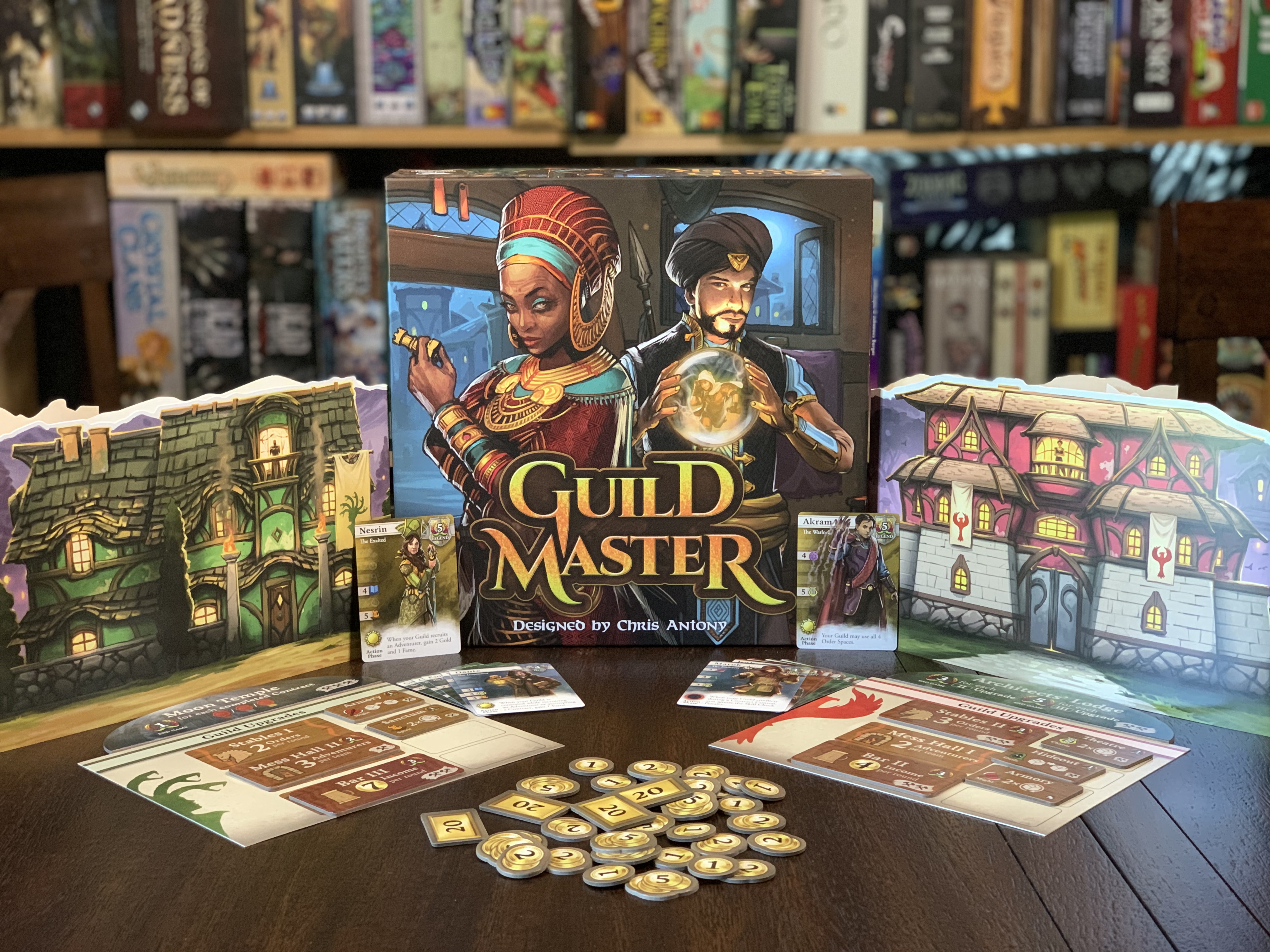
Links/Media
Guild Master Board Game Geek Page
Disclosure
We received the product in order to write an honest review; all reviews reflect the honest opinions of the writer.
WVGamers is a participant in the Amazon Services LLC Associates Program, an affiliate advertising program designed to provide a means for sites to earn advertising fees by advertising and linking to Amazon.com.
